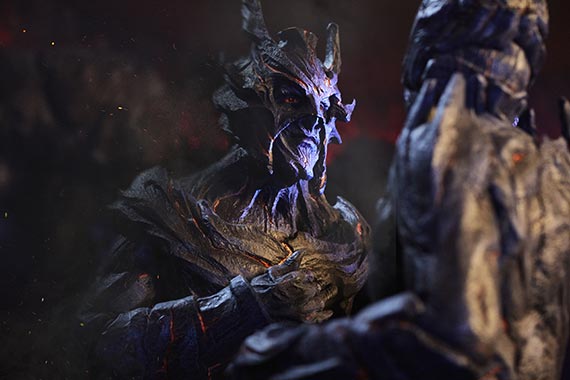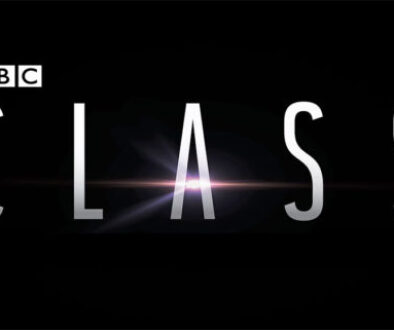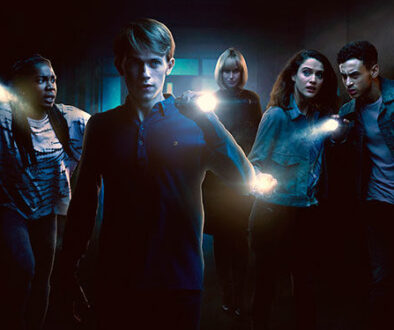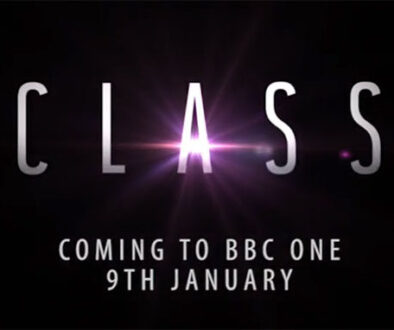Class: Episode 4 “Co-Owner of a Lonely Heart” Review
Clint Hassell gives his verdict on the fourth episode of Doctor Who’s new spin-off.

Note: this review contains full spoilers for the fourth episode, available on BBC3 now.
Ram: “Want to skip class?”
Yes – – this episode, especially.
That’s not an entirely fair critique, as “Co-Owner of a Lonely Heart” is not completely without merit. The scene where April is influenced by her link to Corakinus, and is less-than-empathetic during a civics discussion is actually the episode’s best moment of science fiction, as it utilizes its fantastic premise to examine the human response to war. “If you sign up for war, you sign up to die,” April chides. To empathize with the opposing side as having “signed up for the same thing,” and recognize that they are, in a sense, the heroic protagonists of their own stories is revelatory and a mark of real maturity in Class’ dictate. Note that the episode pointedly explains that using the Rhodian cabinet as a weapon will not only destroy the intended target, but also the souls in the cabinet, mirroring the same concept that Rhodian guns kill both the shooter and the victim. This is subtle, telling evidence of the Rhodian viewpoint on warfare.

If only writer Patrick Ness could have carried this deft sense of examination into the episode’s second and third acts. April and Ram’s intimate dialogue is awful, combining with the laughably swooning soundtrack to create a sex scene so clichéd as to be parody. It is clearly evident that Ness has no concept of believable discourse for this situation, which is immaterial since the scene seems engineered solely to include the awkward joke of Corakinus succumbing to April’s sexual urges. Doctor Who has crossed many genres in its 53-year history, but it has never been quite this lowbrow. Worse, the inclusion of the Corakinus gag actually undercuts April and Ram’s development. Both are scared, grieving the loss of loved ones, and struggling to deal with how rapidly their lives are changing. They choose sex as an outlet for that stress. Instead of examining that choice, and thus providing an in-narrative reason for the characters’ actions, the episode degrades into a teen sex comedy, complete with awkward parental conversation, and ignores the emotional complexities of the characters.

The problem is not that the episode includes sex. Torchwood’s second episode, “Day One,” features an alien gas that feeds off of orgasmic energy. The episode uses the premise to examine the interconnectedness of Carys’ sexuality and self-esteem, as she proceeds to seduce and kill the ex-lovers who undervalued her, and also to lay the foundation for Gwen’s major character arc where she struggles to balance her love for Rhys with her wild attraction to the uninhibited new life she is afforded as part of Torchwood Three. In contrast, “Co-Owner of a Lonely Heart” exploits its characters’ sexuality for a bawdy joke meant only to elicit giggles, which is exploitive at best, and offensively sexist at worst. When Corakinus suggests a “moment of cuddling,” it is clear that Class is aimed towards an audience that is still titillated by, and ill at ease with, sexuality, and cannot comprehend the emotional ramifications of April and Ram’s actions.

Ness’ development of Charlie and Matteusz’s relationship is much more nuanced, capitalizing on the string of honest scenes in “Nightvisiting.” It is initially shocking that Matteusz would use a rare moment of privacy to examine the relative emptiness of Charlie’s Rhodian cabinet, a scene that the episode seemingly addresses when Charlie decides to entrust Matteusz with the secret of the cabinet’s true nature. However, Matteusz is upset that Charlie lied. This is apt for a character who lives so honestly, even getting kicked out of his house due to his openness regarding his sexual orientation. It also demonstrates that Matteusz realizes how much he needs Charlie, and how not being able to trust Charlie puts his physical well-being at risk, just as not being able to trust his parents’ love was damaging to his emotional well-being. Matteusz has every reason to question Charlie’s motives. Having lived with Charlie, Matteusz has already begun to see Charlie’s dual nature and is having a difficult time reconciling the two sides. This actually lends credence to Tanya beginning to see Charlie as more dictator than prince, later in the episode.
Does Charlie lie to protect the souls of his people, or to keep the Rhodian weapon from the Shadow Kin? “What else are you not telling me?” Matteusz asks Charlie, pointedly, before Charlie responds that the cabinet can also be used to restore the Rhodian population to life. Being faced with reunification with his parents, his people, and his throne, would Charlie choose to stay with Matteusz? Does Matteusz have cause to be concerned? That the episode can so deftly intertwine Matteusz’s need for security with a debate on the morality of Charlie’s culture – – “An entire race is still killed” – – is masterful.

It is almost a detriment that Tanya is the one to question Charlie’s treatment of Miss Quill. Granted, with Ram tied into April’s storyline, Charlie and Matteusz debating the ethics of the cabinet-as-weapon, and Miss Quill learning about Dorothea Anes’ motives, this was the only way to include Tanya in this episode. Still, must it always be the black character that points out the issue of slavery? Perhaps a better choice would have been Matteusz who, now living with Quill, sees firsthand the dehumanization of her predicament, and who, as Charlie’s boyfriend, would give the young prince even more reason to question his Rhodian morality.
It’s as if Patrick Ness shoehorned in the April/Ram sex scene merely to make a ribald joke, and forced Tanya into the Charlie/Quill conflict solely to include her in the episode. Writing characters and dialogue around a predetermined situation, rather than letting their actions play out more organically, limits character development, and the quality certainly showed, in this episode.

This concept of writing characters to a preordained state extends to Class’ adult cast. In order to establish the series as “young adult,” and its teen characters as protagonists, all of the adults are portrayed negatively. Varun and Vivian are controlling; April’s mom is out-of-touch, and her dad doesn’t understand healthy boundaries; Matteusz’s parents are bigots. Even adult characters like Headteacher Armitage, Coach Dawson, and Dorothea Anes are portrayed as ineffectual, mean, or obviously villainous. While this situation is understandable considering that Class’ target teen audience is beginning to develop autonomy and establish independence – – what teenager doesn’t think their parents are, like, totally unfair, at some point? – – the practice is not only divisive, it actually necessitates that half of the cast be one-dimensional. Ness has created some incredibly layered teen characters; it’s short-sighted to think that there cannot be conflict between them and well-written adult characters. It is similarly myopic to assume that Class’ young adult audience needs the show to pander to them.








